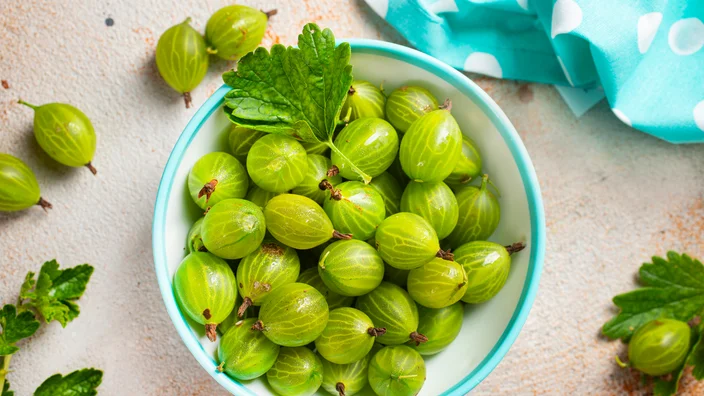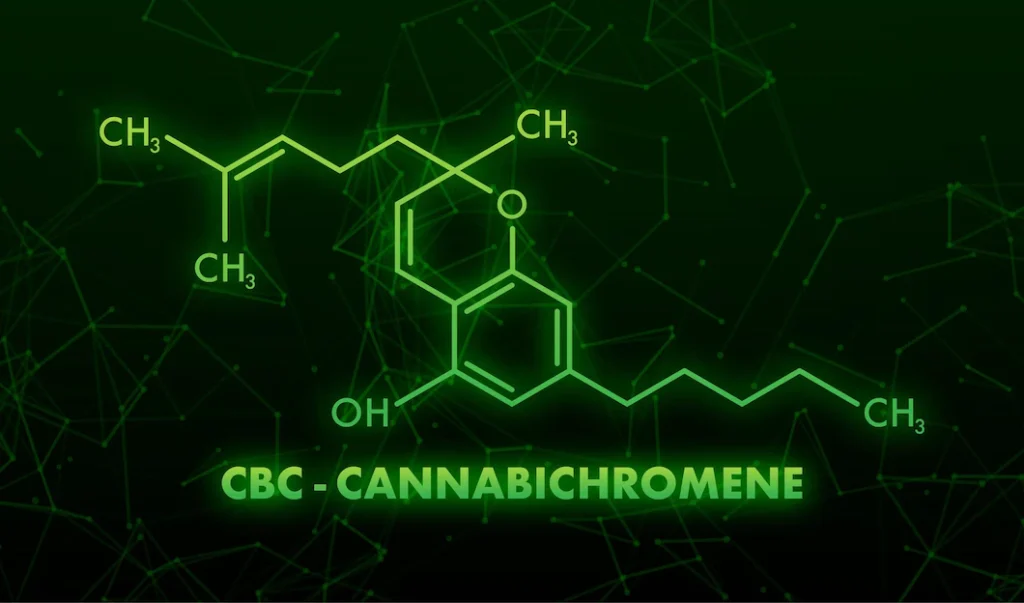
Glutathione: The Body’s Superhero
August 26, 2020

Our guest writer today is Zilis Ambassador and Medical Advisory Board member, Madelin Andry. Madelin is a regional and national speaker on wellness, mindfulness, and successful business mindset. She is a licensed nurse with over 20 years of experience in patient care. Drawing on her intense life experiences, Madelin has parlayed her numerous challenges into exceptional success in the fields of business and wellness coaching. She is also a Reiki Master, and advanced yoga instructor, as well as a wife and mother of 5 wonderful children.
What is glutathione?
The classic definition states that glutathione is an antioxidant and a tripeptide. It is made up of three amino acids – cysteine, glycine, and glutamate1 and it is found abundantly throughout the body – or it should be.
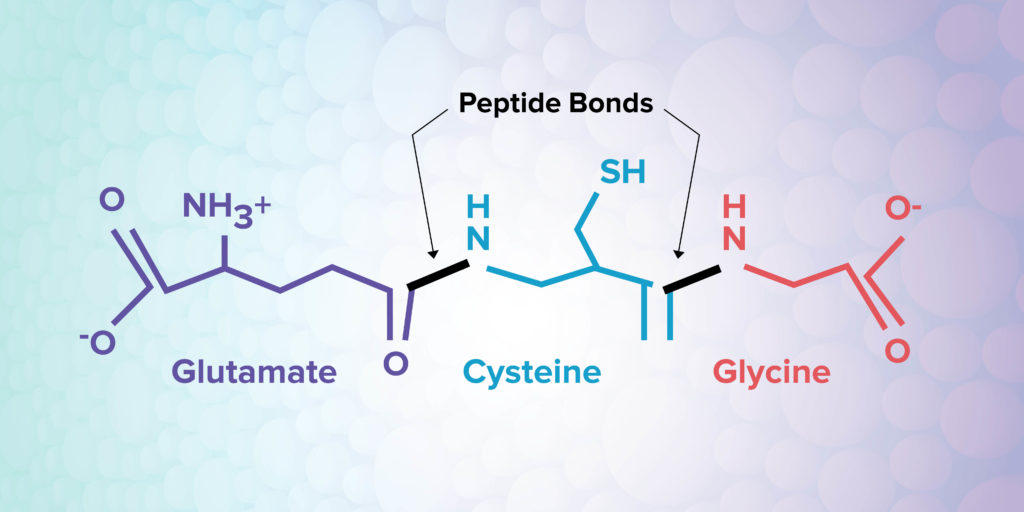
Glutathione is not just any antioxidant though; it is the superhero of all antioxidants or as I like to call it the Mac-Daddy of all antioxidants. One of the most amazing things about glutathione is your body makes it!
In reality for most everyone this doesn’t tell us much. Nor does it tell us about what it does for our health or why it is important. What purpose does it serve? AND why it is critical to the wellbeing of so many, including animals? To answer these questions, I would like to break this down into three parts to hopefully provide a clear understanding of how the body works and how glutathione (and other antioxidants) play a key role in health from a cellular level.
First, let’s talk about free radicals and what they are. Second, what is an antioxidant and what do they do, and third, what is oxidative stress.
I feel like people hear the words free radicals and/or antioxidants often, but don’t truly understand what they mean. What they are? Where they come from, what’s the impact they have or can have on the body?
Let’s dive in!
Free Radicals- The good, the not-so-good, and the bad
I know when I hear the words free radicals, I used to think “crazy, scary health problems” and my mind immediately goes to so many negative things. Do you think the same thing? What if I told you that free radicals are a normal part of our physiology? Well, free radicals are indeed that!
Some are produced due to environmental toxins like pollution or cigarette smoke, exposure to pesticides, cleaning products, and even ultraviolet rays from the sun. However, free radicals are also produced as just part of normal everyday bodily functions. For example, when you eat a meal, your body requires the production of free radicals to convert your food into an energy source it can use.
A lot of us have some kind of daily exercise or movement routine and when you do this routine your body produces free radicals to break down muscle tissue which is necessary to build stronger muscles.
Another example of a normal physiology that produces free radicals is when you are exposed to a virus, bacteria, or some other agent like mold or fungus your body will mount an immune response, and in doing so it will produce free radicals. Free radicals are designed to fight off the pathogens we get exposed to.
Time for science
So, what is a free radical actually, and why all the negativity around it if it is simply a part of everyday life? A free radical is a molecule in the body that has lost an electron (with a negative charge) and has become positively charged, instead of remaining neutrally charged.2 Meaning it is a molecule that has lost its electrical balance.
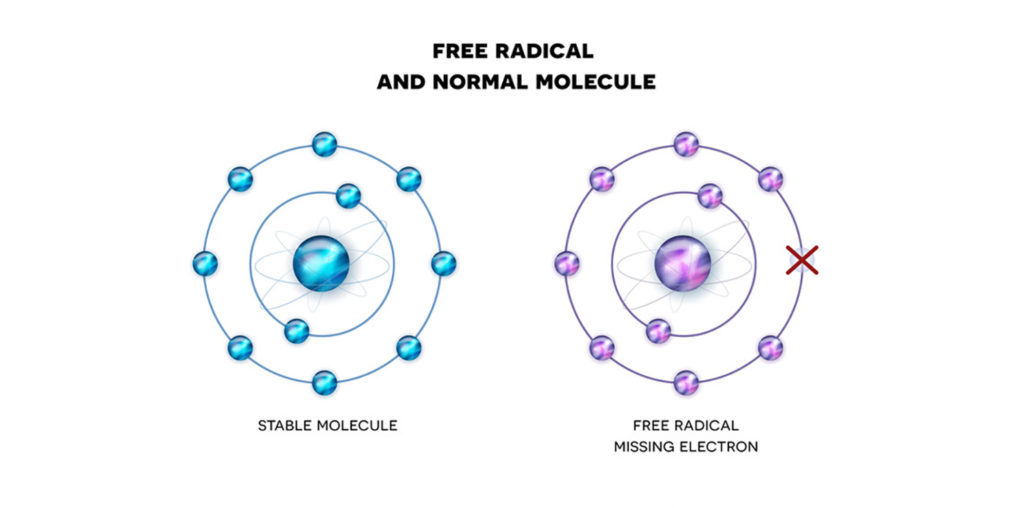
This is a big deal because these positively charged molecules (free radicals) can cause damage to DNA, proteins, carbohydrates, and fats in our body. When this occurs over time the body loses homeostasis. If you remember, homeostasis is the state of being in balance, especially in reference to the body. Damage to our body occurs when the free radical steals an electron from a healthy molecule; this is done in an attempt to balance itself but unfortunately it creates imbalance in the other healthy molecules. This damage is called oxidative stress. When left unchecked (this will be discussed further) oxidative stress can lead to a long list of health problems.
So, if the body’s natural physiology uses free radicals for energy creation, muscle building, and as an immune defense how does it protect your 30 trillion cells? Well, this is why it is critical for the body to have antioxidants, and your body makes glutathione for this very reason!
Antioxidants to the rescue
An antioxidant is a molecule that is capable of giving up an electron to a free radical helping to stabilize it while still remaining stable itself.3 Free radicals can create a domino effect as they hunt throughout the body for balance and antioxidants rescue the body by stopping the free radicals in their tracks.4
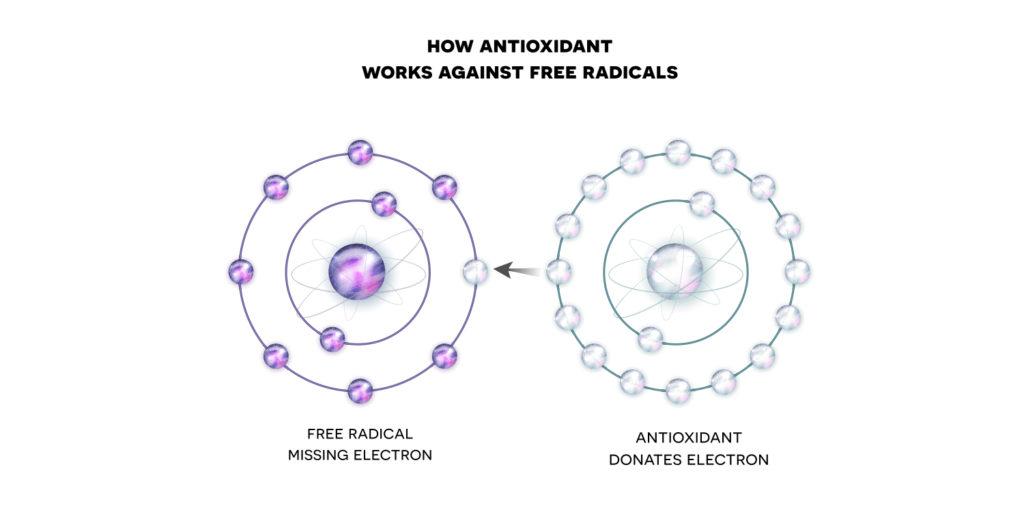
But antioxidants do so much more for the health of the cells in your body. Not only do they donate electrons when needed but they also work to detoxify the body in many other ways. For example, glutathione helps to remove mercury from the blood. Some antioxidants prevent free radicals from ever forming (glutathione), and some prevent the damage a free radical can do to healthy molecules before it happens (glutathione, vitamin C, and vitamin E). They can also help each other out; glutathione helps keep vitamin C and vitamin E (other vital antioxidants needed from supplementation and diet because the body does not make them) in an active state by recycling them, which allows them to neutralize free radicals throughout the body.5
Now that there is some understanding around free radicals and antioxidants what is the big health picture? This leads us to oxidative stress and what it is.
Free radicals vs. Antioxidants = Oxidative Stress
Oxidative stress occurs when you have an imbalance between free radicals and antioxidants. Remember free radicals are simply a part of everyday life (but also exposure to other things). This is really all about homeostasis. A great everyday example of oxidative stress that you can visualize is that of an apple or an avocado.
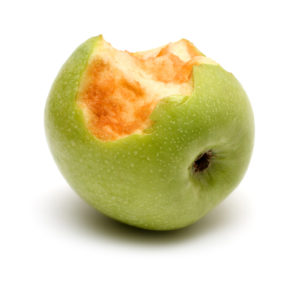
Have you ever cut into an apple and didn’t eat it right away and it began to turn brown? Or have you cut an avocado open and only ate half of it and the other half turned brown pretty quick even in the refrigerator? This is oxidative stress. The damage of cutting either fruit and exposing them to the air creates free radicals on a molecular level. The neat thing is when you rub those apple slices with a lemon slice; the antioxidant vitamin C in the lemon stops it from turning brown. Or when you use that avocado to make guacamole and add the lime juice (which has vitamin C also), the guacamole doesn’t turn brown (cooking tip: add the juice from a whole lime to two avocados and the guacamole will stay fresh in the refrigerator for a few days). This happens because the antioxidant vitamin C balances out the free radicals caused by the damage of cutting the fruit stopping the oxidative stress process temporarily. This same process happens in the body!
Our goal is to understand what really causes increased free radical production, what causes glutathione depletion, and a lack of antioxidants in the body. When you can understand these, you are better armed to help assist the body in finding the best balance possible.
Recap & Review
Some causes that can increase free radical formation are: 6
- pollution in the air or water,
- pesticides,
- excessive heavy metal exposure,
- cigarette smoke,
- alcohol, or other certain drugs,
- certain cleaning products or solvents,
- some cooking methods (for example food-smokers, reusing oil, i.e. deep-fryers,
- high fat foods, and Standard American Diet (SAD; this diet does not contain foods in their wholefoods form where they are most nutritious and healing to the body), and
- radiation.
Decreasing exposure to these items as much as possible, eating organically grown food, drinking filtered water, and using natural cleaning products as much as possible, can decrease the toxic load your body is under.7
Also, besides environmental toxins and poor nutrition of which there has simply been a decline in the nutritional content of food since 1950,8 stress, lack of adequate sleep, and simply aging can decrease glutathione production.
Now, I hope you all understand a little bit more about how the body works and you feel a little bit more ready to take your health back. It isn’t hopeless and in truth there is so much you can do to support balance, well-being, and homeostasis within your health.
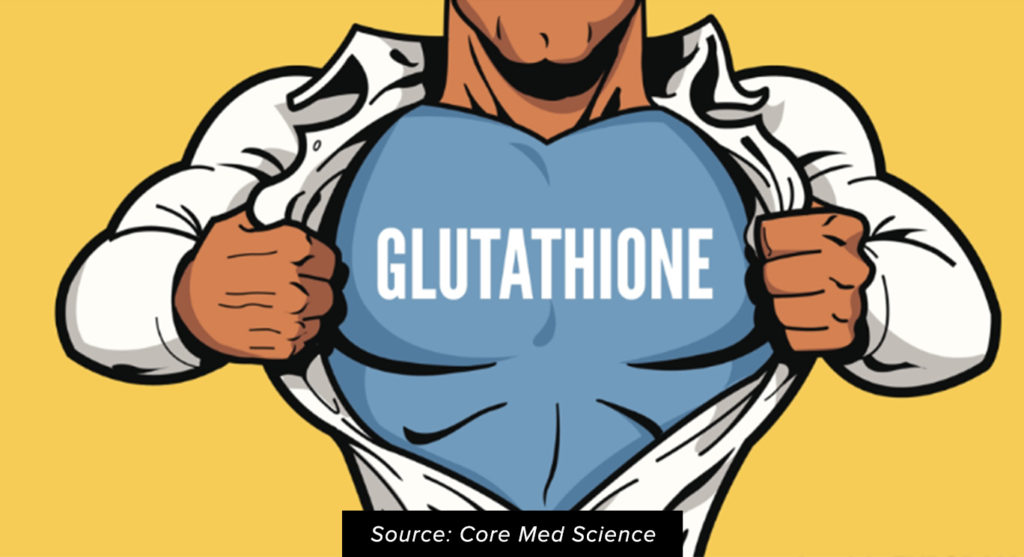
The research shows having good amounts of glutathione available in the body to help fight free radicals can lead to good health and longevity.9 Some of the best ways to support your health is to supplement the body with antioxidants to decrease oxidative stress. Remember, it is all about the balance between the inevitable free radical creation and the available antioxidants to neutralize them.10,11 Again, some of the best antioxidants are vitamin C, vitamin E, melatonin, and of course glutathione!
Next week we’ll hear from our Director of Finance, Jason Leach, as he analyzes “The Health and Wealth of Nations”.
1,2,3,4,5,7, 9,10 Pizzorno J. (2014). Glutathione! Integrative medicine (Encinitas, Calif.), 13(1), 8–12.
6,11 Lobo, V., Patil, A., Phatak, A., & Chandra, N. (2010). Free radicals, antioxidants and functional foods: Impact on human health. Pharmacognosy reviews, 4(8), 118–126. https://doi.org/10.4103/0973-7847.70902
8 Davis DR, Epp MD, Riordan HD. Changes in USDA food composition data for 43 garden crops, 1950 to 1999. J Am Coll Nutr. 2004;23(6):669-682. doi:10.1080/07315724.2004.10719409
About Zilis’ Scientific Research & Development Department
Our Scientific Research and Development Department is headed up by Dr. Marielle Weintraub, a hemp industry expert. She holds a master’s and a PhD in Behavioral Neuroscience and is very active in many dietary supplement and hemp industry trade associations, including her role as the current President of the U.S. Hemp Authority. Dr. Weintraub is committed to the continued development of hemp-specific information and testing to fulfill the Zilis mission.
Science posts for Discover are co-researched and co-written by Kelly McGill, Senior Scientific Technical Writer at Zilis. Kelly holds a bachelor’s degree in English and a master’s in Linguistics / TESL. She has been writing science-related content for over 20 years and is an expert in making difficult concepts easy to understand.
Zilis is the creator of UltraCell™, a CBD oil product derived from hemp. Based in Argyle, Texas, a suburb of Dallas-Fort Worth, Zilis is privately held. Visit zilis.com for more information.
SHARE THIS POST
ABOUT THIS BLOG
Discover : The blog with the lifestyle, nutrition, science, and history of the hemp industry.
It’s your go-to for the most up-to-date information on hemp, CBD, dietary supplements, and more! Check it out!






